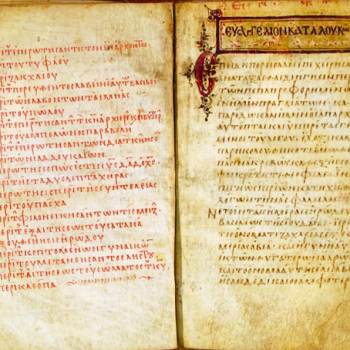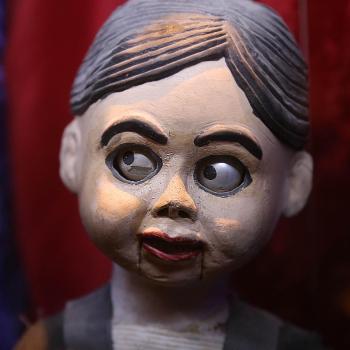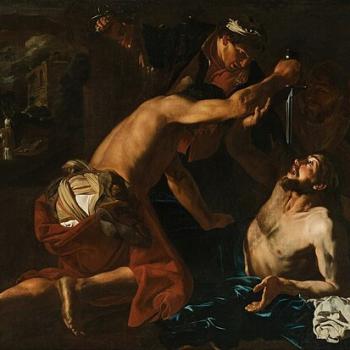A few days later, still confused about what happened at Massabieille, Bernadette told a local priest in the confessional about her vision. Astonished by her composure and the clarity with which she related the story, he asked her permission to speak of this to the pastor, Abbé Peyramale. According to Fr. René Laurentin's exhaustive biography, Bernadette of Lourdes, all that Peyramale had to say was, "We must wait and see."
Neighbors and friends tried to convince Bernadette's parents to change their minds. One town notable told her father, sensibly, "A lady with a Rosary -- that can't be anything bad." Eventually her parents relented and Bernadette returned, this time with a few other children.
Once more the girl in white appeared. Bernadette asked the vision to "stay if she came from God, to leave if not." Hedging her bets, Bernadette threw holy water in the direction of the apparition, who merely smiled and inclined her head. Bernadette's demeanor during the apparitions -- she was pale and immobile throughout -- so frightened her companions that they raced to a nearby mill for help. Eventually, the girl's mother, in obvious distress, ran to the grotto from town. Embarrassed by Bernadette's actions, she had to be restrained from beating her daughter.
By the time of the third apparition on February 18, many in Lourdes were taking a keen interest in Bernadette's tale. Some pressed her to ask the vision who she was. But when Bernadette came to the vision with a paper and pen, and asked for a name, the vision merely laughed, and spoke for the first time. "Would you have the goodness to come here for fifteen days?"
During the next two visits, the vision appeared to Bernadette, now accompanied by the growing crowd. After the sixth apparition, on February 21, Bernadette was harshly questioned by the dubious local police commissioner, who tried to ascertain if she was merely pulling a childish prank. During the investigation, he tried to get her to say that she was seeing the Virgin Mary, but Bernadette persisted in referring to the vision, in the patois, as Aqueró (that thing). When pressed to elaborate, she described the vision as wearing "a white robe drawn together with a blue sash, a white veil over her head and a yellow rose on each foot."
Reading the actual transcripts one discovers the honesty, simplicity, and persistence that would later impress her supporters. "Stalwart," Ruth Harris calls her. When the police commissioner took notes, he slyly changed the record, and read it back to her. "The virgin smiles at me," he said.
"I didn't say the virgin," said Bernadette, correcting him.
For me, this is one of the most compelling aspects of Bernadette Soubirous. She is uninterested in impressing anyone. She avoids saying, until almost the final apparition, that she is seeing the Virgin Mary (though others in the town claim this almost from the beginning). She is, despite her family's poverty, unwilling to profit in any way from her experiences, refusing any and all gifts. In all of her testimonies, Bernadette simply tells what she saw and what she didn't see, what she heard and what she didn't hear. In this way she reminds me of Joan of Arc who said, in essence, this is my experience, believe me if you like.
On February 25, after two intervening apparitions, Bernadette returned to the Grotto. The assembled crowd saw Bernadette not in an ecstatic state, as in previous visits, but suddenly clawing at the ground in the grotto, drinking some muddy water that she had uncovered, and stuffing her mouth with weeds. Bernadette explained her actions: "She told me to drink of the spring and wash yourself in it. Not seeing any water, I went to the Gave. But she indicated with her finger that I should go under the rock . . ." The eating of the weeds was an act of penance, said Bernadette, for sinners.
But to onlookers Bernadette was merely scratching at the dirt and eating weeds. They were, predictably, horrified. "She's nuts!" someone shouted out. Her aunts, who had accompanied her gave her a sharp smack as they left the grotto.
In the movie The Song of Bernadette, Bernadette's humiliation leads to the film's dramatic highpoint. After the protagonist and the rest of the crowd leave the grotto, a townsman sits down to rest at the site. As the camera focuses on his hand resting on the dry ground, a few drops, then a trickle, and then a little stream, flows past. "Look, water!" he shouts to swelling music. In reality, as René Laurentin describes it in Bernadette of Lourdes, a small group of townspeople stayed behind to examine the hole Bernadette had begun, and the more they dug, the more pure water gushed forth. But even the movie's account underlines the significance of the day: Bernadette had uncovered the fountain that would become the focus of later pilgrimages and hope for healings.




